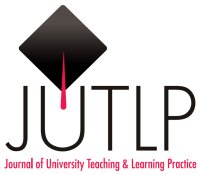Cognitive presence and self-regulated learning : Learning transfer in an online allied health course.
Online learning has become more common since the COVID-19 pandemic, but limited research has examined factors affecting students' ability to transfer learning from online to the real world. This mixed-methods study explored the relationships between higher-order thinking skills, namely cognitiv...
| Institution: | University of South Australia |
|---|---|
| Autori principali: | Maranna, Sandhya, Claassen, Alrike, Joksimovic, Srecko, Willison, John, Parange, Nayana, Costabile, Maurizio |
| Pubblicazione: |
Journal of University Teaching & Learning Practice v.22 n.1 p.1-23 https://doi.org/10.53761/h2gnev81
2025
|
| Soggetti: | |
| Accesso online: | https://doi.org/10.53761/h2gnev81 |
Documenti analoghi
Documenti analoghi
-
Factors that influence cognitive presence : A scoping review.
di: Maranna, Sandhya, et al.
Pubblicazione: (2022) -
"Monkey See, Monkey Do, That's Not Going to Actually Teach You" : Becoming a Self-Directed Learner in Enabling Mathematics Units.
di: Mann, Gemma, et al.
Pubblicazione: (2020) -
You've Got Mail : A Technology-Mediated Feedback Strategy to Support Self-Regulated Learning in First-Year University Students.
di: Sauchelli, Isabella, et al.
Pubblicazione: (2024) -
First-Year Students' Academic Self-Efficacy Calibration : Differences by Task Type, Domain Specificity, Student Ability, and Over Time.
di: Talsma, Kate, et al.
Pubblicazione: (2020) -
Using Video Annotation Software to Develop Student Self-Regulated Learning : Final Report.
di: Dawson, Shane, et al.
Pubblicazione: (2016)

















